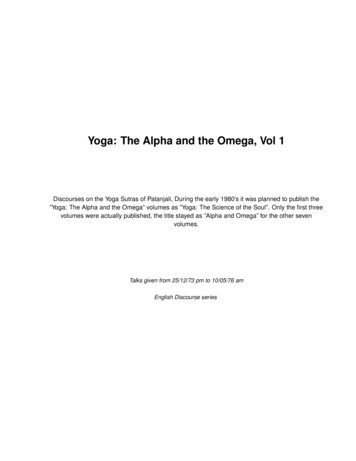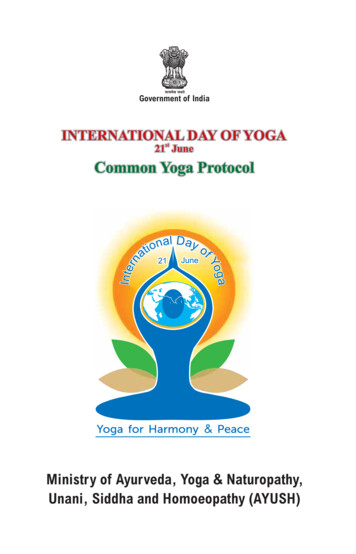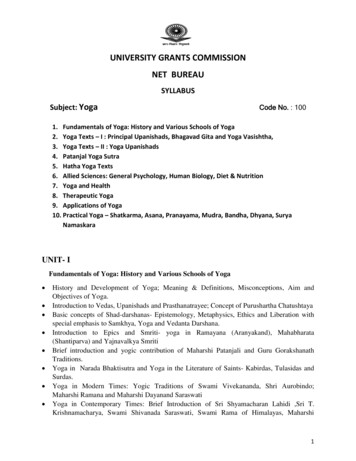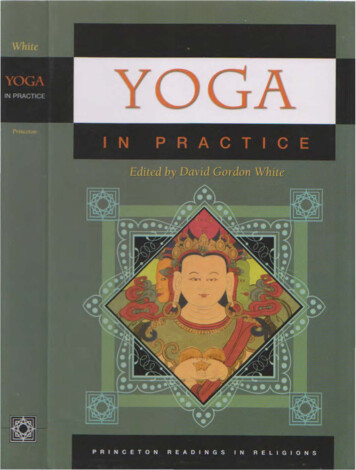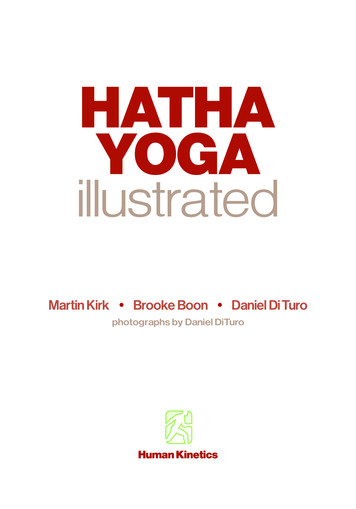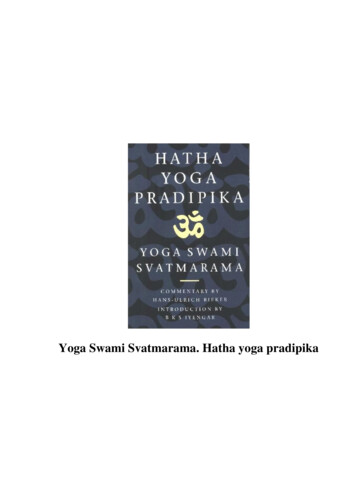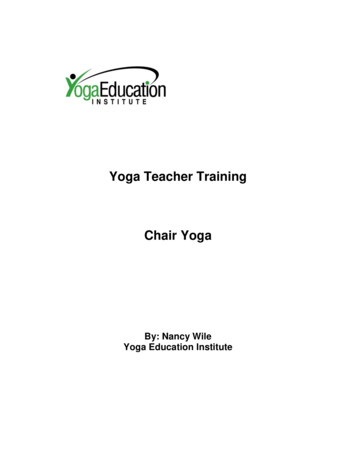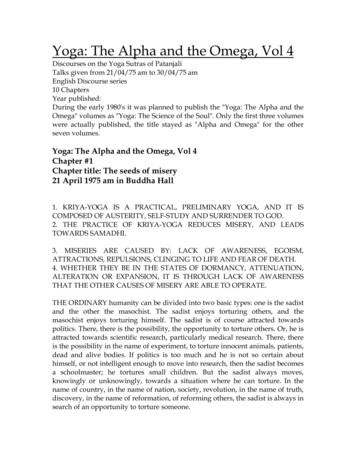
Transcription
Yoga: The Alpha and the Omega, Vol 4Discourses on the Yoga Sutras of PatanjaliTalks given from 21/04/75 am to 30/04/75 amEnglish Discourse series10 ChaptersYear published:During the early 1980's it was planned to publish the "Yoga: The Alpha and theOmega" volumes as "Yoga: The Science of the Soul". Only the first three volumeswere actually published, the title stayed as "Alpha and Omega" for the otherseven volumes.Yoga: The Alpha and the Omega, Vol 4Chapter #1Chapter title: The seeds of misery21 April 1975 am in Buddha Hall1. KRIYA-YOGA IS A PRACTICAL, PRELIMINARY YOGA, AND IT ISCOMPOSED OF AUSTERITY, SELF-STUDY AND SURRENDER TO GOD.2. THE PRACTICE OF KRIYA-YOGA REDUCES MISERY, AND LEADSTOWARDS SAMADHI.3. MISERIES ARE CAUSED BY: LACK OF AWARENESS, EGOISM,ATTRACTIONS, REPULSIONS, CLINGING TO LIFE AND FEAR OF DEATH.4. WHETHER THEY BE IN THE STATES OF DORMANCY, ATTENUATION,ALTERATION OR EXPANSION, IT IS THROUGH LACK OF AWARENESSTHAT THE OTHER CAUSES OF MISERY ARE ABLE TO OPERATE.THE ORDINARY humanity can be divided into two basic types: one is the sadistand the other the masochist. The sadist enjoys torturing others, and themasochist enjoys torturing himself. The sadist is of course attracted towardspolitics. There, there is the possibility, the opportunity to torture others. Or, he isattracted towards scientific research, particularly medical research. There, thereis the possibility in the name of experiment, to torture innocent animals, patients,dead and alive bodies. If politics is too much and he is not so certain abouthimself, or not intelligent enough to move into research, then the sadist becomesa schoolmaster; he tortures small children. But the sadist always moves,knowingly or unknowingly, towards a situation where he can torture. In thename of country, in the name of nation, society, revolution, in the name of truth,discovery, in the name of reformation, of reforming others, the sadist is always insearch of an opportunity to torture someone.
Sadists are not very attracted towards religion. The other type is attractedtowards religion, the masochist. They can torture themselves. They become greatmahatmas, they become great saints, and they are revered by the society becausethey torture themselves. A perfect masochist always moves directly towardsreligion, just as a perfect sadist moves towards politics. Politics is the religion ofthe sadist; religion is the politics of the masochist. But if a masochist is not toocertain, then he can find some other sub paths. He can become an artist, apainter, a poet, and can allow himself to suffer in the name of poetry, literature,painting.You must have heard the name Vincent Van Gogh, the great Dutch painter. Hewas the perfect masochist. If he had been born in India, he would have become aMahatma Gandhi; but he became a painter. He had not much money. His brotherused to give him only enough to survive. Out of the seven days of the week, hewould eat only on three days, and the other four days of the week he would fastin order to paint.He was in love with a woman, but the father of the woman wouldn't allow himto see her. So he forced his hand on a burning flame and he said, 'I will keep myhand on the burning flame until you allow me to see her.' He burnt his hand.A prostitute told him, 'Your ears are very beautiful,' because there was nothingelse to appreciate in his face. He was one of the ugliest men, he had ugly features.The prostitute must have been in a difficulty with this man, so she told him thathis ears were very beautiful. He went back home, cut one of his ears off with aknife, packed it, went back to her with blood flowing all over, and presented theear to the woman saying, 'You liked it so much that I would like to give it to youas a gift.'He continued painting in the hottest part of France, Arles, in the summer whenthe sun was very hot. Everybody told him, 'You will get ill, the sun is too hot.'But the whole day, particularly when the sun was hottest, at full noontide, hewould be standing in the fields and painting. Within twenty days he went mad.He was young, thirty three or thirty four when he killed himself, committedsuicide.But in the name of painting, art, beauty, you can torture yourself. In the name ofGod, in the name of prayer, in the name of sadhana, you can torture yourself.You will find this type very predominant in India: lying on a bed of nails, thorns,fasting for months. You will come across people who have not slept for ten years.They remain standing, fighting with sleep. There are people who have beenstanding for years, they have not taken any other posture; their legs are almostdead. There are people who are living with one hand raised towards the sky; thewhole hand has gone dead, no more blood circulates in it, it is just bones. Thesepeople are ill; they need treatment. But thousands are attracted towards to them.All of your politicians, Adolf Hitler or Joseph Stalin or Mao Tse Tung, needtreatment. And all of your Mahatmas need treatment also, because a man who isinterested in torturing himself or others is ill, deeply ill. To be interested in
torture, either of the other or of oneself, to be interested in torture is anabsolutely certain symptom of deep illness. When you are healthy you don'twant to torture others, you don't want to torture your. elf. When you are healthy,you enjoy. When you are healthy you feel so blissful that you would like to blesseverybody. You would like your blessings to flow from your being to the beingsof all others, to the whole of existence. You al!e overflowing with bliss. Health iscelebration. Illness is a torture, either of the other, or of yourself.Why am I saying this before I start talking about Patanjali? I am saying it becauseup to now, Patanjali has always been commented upon by masochists. Butwhatsoever I am going to say about Patanjali is going to be totally different fromall the other commentaries. I am not a masochist, I am not a sadist. I amcelebrating myself and I would like you to participate with me. My commentaryon Patanjali is going to be basically different from all the previous commentaries.My commentary will be just the same as if Patanjali himself were commenting.He was neither a sadist nor a masochist. He was a perfectly integrated man withno inner illness, with no psychological problems, with no obsessions. He washealthy, whole, integrated. Whatsoever he has said can be interpreted in threeways. A sadist may come upon it, but that is rare because sadists are notinterested in religion. You cannot imagine Mao Tse Tung, Adolf Hitler, or JosephStalin being interested in Patanjali, no. Sadists are not interested, so they havenot commented. Masochists are interested in religion, and they have commentedand given their own color to Patanjali. There are millions of them, andwhatsoever they have said has completely distorted Patanjali's message,completely destroyed it. Now, after thousands of years, those commentaries arestanding between you and Patanjali. Still, they go on growing.Patanjali's yoga sutras are one of the most commented upon things; they arepregnant with significance, they are very deeply meaningful. But where does onefind a Patanjali to comment upon them? Where does one find a man who is notill in any way? Because illness will color; you cannot help it. When you interpret,you are in your interpretation, you have to be there; there is no other way tointerpret. I am going to say things which are not said, and you may find mecontinuously different from all the commentaries.Remember this fact, because I am neither a masochist nor a sadist. I have notcome to religion to torture myself; just the opposite has been the case. In fact, Ihave never come to religion. I have-simply been enjoying myself and religion hashappened, just by the way. It has been a consequence. I have never practiced theway religious people practice, I have never been in that type of search. I havesimply lived in deep acceptance of whatsoever is. I have accepted existence andmyself, and I have never been in any mood to change myself. Suddenly, the moreI accepted myself, the more I accepted existence, a deep silence descended uponme, a bliss. In that bliss religion has happened to me. So I am not religious in theordinary sense of the word. If you want to find a parallel, you will have to seek itsome where other than in religion.
I feel deep affinity with a man who was born two thousand years ago in Greece.His name was Epicurus. Nobody thinks of him as religious. People think that hewas the most atheistic man ever born, the most materialistic ever born; he wasjust the opposite of the religious man. But that is not my understanding.Epicurus was a naturally religious man. Remember the words 'naturallyreligious'; religion happens to him. That's why people overlooked him, becausehe never sought. The proverb: Eat, drink and be merry, comes from Epicurus.And this has become the attitude of the materialist.Epicurus in fact lived one of the most austere of lives. He lived as simply asanybody has ever lived. Even a Mahavir or a Buddha were not so simple andaustere as Epicurus, because their simplicity was cultivated; they had worked forit, it had been a practice. They had thought about it and they had dropped allthat w as unnecessary. They had been disciplining themselves to be simple, andwhenever there is discipline, there is complexity. There is a fight in thebackground, and the fight will always be there, in the background. Mahavir wasnaked, nude; he had renounced all, but he had renounced. It was not natural.Epicurus lived in a small garden. The garden was known as Epicurus' garden.He had no academy like Aristotle, or a school like Plato; he had a garden. Itseems simple and beautiful. A garden seems more natural than an academy. Helived in the garden with a few friends. That was probably the first commune.They were just living there, not doing anything in particular, working in thegarden, having just enough to live.It is said that the King once came to visit and he had been thinking that this manmust be living in luxury because his motto was: Eat, drink and be merry. 'lf thisis the message,' the King thought, 'I will see people living in luxury, inindulgence.' But when he arrived he saw very simple people working in thegarden, watering trees. The whole day they had been working. They had veryfew belongings, only enough to live. In the evening, when they were havingdinner, there was not even any butter; just dry bread and a little milk. But theyenjoyed it as if it were a feast. After the dinner, they danced. The day was overand they offered a thanksgiving to the existence. And the King wept, because hehad always thought to condemn Epicurus in his mind. He asked, 'What do youmean by saying, "Eat, drink and be merry?"' Epicurus said, 'You have seen. Fortwenty four hours we are happy here. If you want to be happy you have to besimple, because the more complex you are, the more unhappy you become. Themore complex your life, the more misery it creates. We are simple not becausewe are seeking God, we are simple because to be simple is to be happy.' And theKing said, 'I would like to send some presents for you. What would you like forthe garden and your community?' Epicurus was at a loss. He thought andthought and he said, 'We don't think that anything else is needed. Don't beoffended; you are a great King, you can give everything -- but we don't need. Ifyou insist, you can send a little salt and butter.' He was an austere man.
In this austerity, religion happens naturally. You don't think about God, there isno need to; life is God. You don't pray with folded hands towards the sky; it isfoolish. Your whole life, from the morning until the evening, is a prayer. Prayeris an attitude: you live it, you don't do it.Epicurus could have understood Patanjati. I can understand him. I can feel whathe means. It is for you that I am saying all this, so that you don't get confused,because there are other commentaries which say just the opposite.KRIYA-YOGA IS A PRACTICAL, PRELIMINARY YOGA, AND IT ISCOMPOSED OF AUSTERITY, SELF STUDY AND SURRENDER TO GOD.The first word is 'austerity'. Masochists have converted austerity into self-torture.They think that the more you torture the body, the more spiritual you become.Torturing the body is the way to become spiritual: this is the understanding ofthe masochist.Torturing the body is not a way; torturing is violent. Whether you torture othersor yourself, it is violent; and violence can never be religious. What is thedifference between torturing someone else's body and torturing your own body?What is the difference? The body is 'the other'. Even your own body is the other.Your body is a little closer and the other's body is a little further away, that's all.Because yours is closer it is more likely to become a victim of your violence; youcan torture it. And for thousands of years people have been torturing theirbodies with the false notion that it is the way towards God.In the first place, why would God give you a body? He has not provided youwith any implements to torture your body. Rather, on the contrary, he hasprovided you with sensibilities, sensitiveness, with senses: to enjoy it, not totorture it. He has made you so sensitive because through sensitivity awarenessgrows. If you torture your body you will become more and more insensitive. Ifyou lie down on a bed of thorns, by and by, you will become insensitive. Thebody will have to become insensitive, otherwise how can you continuouslytolerate thorns? The body will become dead in a way, it will lose its sensitivity. Ifyou stand in the hot sun continuously, the body wilt protect itself by becominginsensitive. If you sit naked in the Himalayas when snow is falling and the wholemountain range is covered in snow, by and by, the body will lose its sensitivityto coldness. It will become a dead body.And with a dead body, how can you feel the blessings of existence? How can youfeel the constant shower of blessings that is happening every moment? Existencegoes on pouring millions of blessings upon you; you cannot even count them. Infact, you need more sensitivity to become a religious man, not less, because themore sensitive you are, the more you will be able to see the Divine everywhere.Sensitivity should become the eye, the penetration. When you become absolutelysensitive, every small breeze touches you and gives you the message, and evenan ordinary leaf shaking in the wind becomes such a tremendous phenomenon
because of your sensitivity. You look at an ordinary pebble and it becomes akohinoor. It depends on your sensitivity.Life is more if you are more sensitive; life is less if you are less sensitive. If youhave a completely wooden body with no sensitivity, life is nil, life is no longerthere; you are already in your grave. Masochists have done that. Sadhana hasbecome an effort to deaden the body and the sensitivity.To me, just the opposite is the way. Austerity does not mean torture; austeritymeans a simple life, an austere life. Why a simple life? Why not a verycomplicated life? Because the more complicated the life is, again, the lesssensitive you will be. A rich man is less sensitive than a poor man because hiswhole effort of accumulating riches has made him insensitive. You have to beinsensitive if you are going to accumulate riches. You have to be completely likea murderer and not bother about what is happening to others. You go onaccumulating treasures, and others are dying. You go on becoming more andmore rich, and others are losing their very lives in it. A rich man has to beinsensitive, otherwise he cannot be rich. How will he exploit? -- it will beimpossible.I have heard about a very great rich man; Mulla Nasrudin went to see him. Hewanted some donation for an orphan house that he was running. The rich mansaid, 'Okay Nasrudin, I will give you something, but I have a condition andnobody has ever fulfilled it. Look into my eyes; one eye is false and another eyeis real. If you can tell me exactly which eye is false and which is real, I willdonate.' Nasrudin looked into his eyes and said, 'The left eye is real and the righteye is false.' Amazed, the rich man said, 'But how could you tell?' He said,'Because in the left eye I can see a little compassion; it must be false.'He saw a little compassion, just a glimmer, and it had to be false. A rich mancannot be rich if he is sensitive. In accumulating wealth, he goes on dying.There are two ways to kill your body: one is the way of the masochist whotortures, another is the way of the rich man who accumulates wealth andrubbish. By and by, all the garbage that he accumulates becomes a barrier and hecannot move, he cannot see, he cannot hear, he cannot taste, he cannot smell. Anaustere life means an uncomplicated life, simple. It is not a cultivation of poverty,remember, because if you cultivate poverty through effort, then again the verycultivation will deaden you.A simple life is a life of deep understanding, not of cultivation. k is not a practiceto become poor. You can practice being poor, but through the practice yoursenses will harden. Practice of anything makes you hard; the softness is lost, theflexibility is lost. Then you are no longer flexible like a child. Then you becomerigid like an old man. Lao Tzu says, 'Rigidity is death, flexibility is life.' A simplelife is not a cultivated, poor life. Don't make poverty your goal and don't try tocultivate it. Just understand that the more simple, unloaded your body and mindare, the more you penetrate into existence. Unburdened, you can come into direct
contact with reality; burdened you cannot come. A rich man always has his bankbalance in the way.You see the Queen of England, Elizabeth? She cannot even shake hands withoutgloves on. She cannot even touch humanity without gloves on. Even the humantouch seems to be something impure, something ugly. A queen, a king, liveencapsulated; it is not only a question of the hand. That is just a symbol to saythat the Queen is entombed; she is no longer alive.In the Middle Ages in Europe it was thought that kings and queens didn't havetwo legs, because nobody had ever seen them naked. It was thought that theyhad only one leg. They were not human; they were living at a distance. Egoalways tries to live at a distance, and the distance makes you insensitive. Youcannot come and touch a child playing on the road. You cannot come near a treeand embrace the tree. You cannot come nearer to life; you are pretending thatyou are higher than life, greater than life, bigger than life. The distance has to becreated and only then can you pose as being bigger than life. But life is not losinganything by your foolishness; you are only becoming more and more insensitive.You are already dead. Life needs you to be more alive.When Patanjali says 'austerity', he means, 'Be simple, don't cultivate it.' Becausecultivated simplicity is not simplicity. How can a cultivated simplicity be simple?It is very complex; you have been trying, calculating, cultivating.I know a man; I happened to pass by the village where he was living. My driversaid, 'Your friend lives here, just outside the village.' So I said, 'It is good. Just fora few minutes I will go see him, and see what he is doing now.' He was a Jainmonk. When I reached near his house, through the window I could see himwalking naked inside. Jain monks have five stages; by and by, they cultivatesimplicity. At the fifth stage, the last, they become naked. First they will wearthree articles of clothing, then two, then one, and then that too is to be dropped.That is the highest ideal of simplicity, when one becomes absolutely nude;nothing to carry -- no burden, no clothes, no things. But I knew that this man wasonly in the second stage, so why was he nude?I knocked on the door. He opened the door, but now he was wrapped in alunghi. So I asked, 'What is the matter.? Just now I saw you through the windowand you were nude.' He said, 'Yes, I am practicing. I am practicing for the fifth,the last stage. First, I will practice inside the house, then with friends; then, byand by, I will move to the village, and then to the larger world. I have to practice.It will take at least a few years for me to drop the shyness, to be courageousenough to move naked in the world.' I told him, 'You had better join a circus.You will be nude, but a practiced nudity is not simple; it is very calculated. Youare very cunning, and you are moving step by step with cleverness. In fact, youwill never become nude. A practiced nudity will be like clothes again, verysubtle clothing. You are creating them by practice.'If you feel like an innocent child, you will simply drop the clothes and move inthe world. What is the fear -- that people will laugh? What is wrong in their
laughter? -- let them laugh. You also can participate, you also can laugh withthem. They will make fun of you -- so far, so good, because nothing kills ego likepeople making fun of you. It is good, they are helping you. But by this practicefor five years, you will miss the whole thing. Nudity should be innocent like achild's. Nudity should be an understanding, not a practice. Through practice,you are finding a substitute for understanding. Innocence is not of the mind, it isnot a part of your calculating, your reasoning. Innocence is an understanding ofthe heart.'Austerity cannot be practiced. You simply have to look at life and see that themore complicated you become, the less sensitive you become. And the lesssensitive you are, the farther away from the Divine you are. The more sensitiveyou become, the closer and closer and closer you come. A day comes when youare sensitive to the very roots of your being; suddenly you are no longer there,you are just a sensibility, a sensitivity. You are no longer there, you are just anawareness. And everything is beautiful then, everything is alive; nothing is dead.Everything is conscious; nothing is alive, nothing is dead. Everything isconscious, nothing is unconscious. With your sensitivity, the world changes. Atthe last moment, when the sensitivity reaches to its total, its ultimate climax, theworld disappears; there is God. God is not to be found, really; sensitivity has tobe found. Be sensitive so totally that nothing is left behind, no holding back; andsuddenly, God is there. God has always been there, only you were not sensitive.To me, austerity is a simple life, a life of understanding. You need not move intoa hut, you need not go naked. You can live simply in life, with understanding.Poverty will not help but understanding will. You can force poverty on yourself,you can become dirty, but that won't help.This is happening now in the West with hippies and other sorts of people. Theyare again making the same mistake that India has been making for a long time.India has known all sorts of hippies in the past. They have lived the dirtiest livespossible. Just in the name of austerity, they would not take baths because theyfelt, 'Why bother, and why decorate the body?'Did you know that Jain monks don't take baths? You cannot sit near them; theystink. They don't brush their teeth. You cannot talk to them; there is a bad smell,a bad odor comes out of their mouths. And this is thought to be austerity,because they say, 'Even bathing or cleaning the body is to be a materialist. Thenyou are much too involved with the body, so why bother?' But this type ofattitude is just moving to the other extreme, from one foolishness to another.There are people who are engaged with the body for twenty-four hours. You canfind women wasting hours before the mirror. This is one type of foolishness: justcleaning the part continuously, never noticing that it is only a part. Good, cleanit, but don't clean it continuously the whole day, otherwise it is an obsession. Aclean body is good, but a continuous obsession with cleaning it -- that ismadness. There are people who are continuously decorating their bodies. Almost
half of the industries of the world are devoted to body decorations: powders,soaps, perfumes.Cleanliness is good, but it should not be an obsession. It had become anobsession in the West, and now, the other pole. People who are too concernedwith the body, with clothes and cleanliness and this and that, are 'square' people.But the hippies have moved to the other extreme -- they don't bother at all. Theyare dirty, and the dirtiness has become a religion. As if just by being dirty, theywill attain to something. They are simply becoming more and more insensitive tothe beauties of life.Because you have become so insensitive, drugs have become so important. Nowit seems that you cannot be sensitive with out chemical drugs. Otherwise, anaustere man is so sensitive that he does not need the drugs. Whatsoever youexperience through drugs, he experiences just through his sensitivity. You takethe drug and an ordinary tree becomes a marvelous phenomenon -- every leaf aunique world in itself, thousands of greens in one tree. And every floweremanates light, becomes a prism. An ordinary tree that you have passed so manytimes and never looked at, suddenly becomes like a dream, an ecstasy, a rainbowof colors. This is what happens to a sensitive man without taking any drugs. Totake the drugs means that you have become so hardened and dull and dead thatnow a chemical aggression is needed on your body. Only then for a fewmoments the window will open and you will see the poetry of life, and again thewindow will be closed; and more and more quantity of the drug will be needed.The moment will come when even drugs won't help. Then you will really bestoned!Become more sensitive, become more austere. And when I say 'become', I don'tmean practice, I mean understand. Try to see that whenever you are simple,things go beautifully. When ever you are complex, things become problematic;you create more puzzles to be solved and everything becomes entwined, a mess.Live a simple life of needs being fulfilled, with no mad desires. You need food,you need clothing, you need a shelter -- finished. You need somebody to love,you need somebody to be loved by. Love, food, shelter -- simple; but you createmillions of desires. If you need a Rolls Royce then difficulties arise. If you need apalace, or you are not satisfied with ordinary womankind, you need a MissUniverse -- and all your Miss Universes are almost dead -- you need somethingimpossible: then you go on and on. And you have to go on postponing,'Someday, when I have a palace, then I will sit silently.' But meanwhile the life isflowing out of your fingers. If ever it should happen that you acquire yourpalace, you will have forgotten how to sit silently because, running after thepalace, you will completely forget how to sit. That happens to all ambitiouspeople -- they run. Then running becomes their very way of life. A momentcomes when they have achieved, but now they cannot stop. You know it well,that if for the whole day you have been thinking and thinking, you cannot stop.
Mulla Nasrudin once came home after having decided that day to do somethingand not forget it. He had put a knot in his clothing so that he would remember.Then, when he got home, he was frantic because he had forgotten.'The knot isthere, but for what?' He tried to think. His wife insisted, 'Now you go to sleepand tomorrow morning we will see.' But he said, 'No, it is something veryimportant. It was important and I had decided to do it tonight. At no cost can Ineglect it, so you go to sleep.' In the middle of the night when the clock chimedtwo, he remembered. He had decided to go to bed early. That was what the knotwas for.This is happening to all ambitious people. They desire so much, and by the timethey reach their goal they have completely forgotten for what they werereaching. In the first place, for what were they desiring so many things? Nowthey have achieved and they have forgotten. Even if they remember that theyhad wanted to be silent, relaxed, to enjoy life, now their whole pattern of life andthe whole conditioning will not allow them to relax, will not allow them to sitsilently and enjoy. When you run with ambition for your whole life, you cannotstop easily. Running becomes your very being. If you want to stop, this is themoment. There is no future for it, this is the moment.Needs are simple. A man can live a very simple, austere life and enjoy it. Richfood is not needed to enjoy food, only a rich tongue is needed. By the time youare able to accumulate rich food, you will have lost the very capacity to enjoy it.Enjoy it while the moment is still there. Enjoy it while you are alive. Don't wasteit and don't postpone it.An austere man lives moment to moment -- 'This day is enough for itself, andtomorrow will take care of itself.' Says Jesus again and again, 'Look at the lilies ofthe field, at how beautiful they are. They don't bother about the morrow. EvenSolomon was not so beautiful in the moments of his greatest glory as ordinarylily-flowers in the field.' Look at these birds, they are enjoying. This very momentthe whole existence is celebrating -- except you.What is the trouble with man? The trouble is that he thinks that for enjoymentcertain conditions have to be fulfilled first; this is the trouble. To enjoy life in factno conditions are to be fulfilled; it is an unconditional invitation. But man thinksthat certain conditions have to be fulfilled first; only then can he en. joy life. Thisis the complex mind. The simple mind feels that one has to enjoy whatsoever isavailable. Enjoy it! No conditions are to be fulfilled. And the more you enjoy thismoment, the more capable you become of enjoying the next. The capacity grows;the greater and greater it becomes, the higher and higher it goes -- it is infinite.And when you come to the infinity of enjoyment, that is what God is. God is nota person sitting somewhere and wa
Yoga: The Alpha and the Omega, Vol 4 Discourses on the Yoga Sutras of Patanjali Talks given from 21/04/75 am to 30/04/75 am English Discourse series 10 Chapters Year published: During the early 1980's it was planned to publish the "Yoga: The Alpha and the Omega" volumes as "Yoga: The Science of the Soul". Only the first three volumes

